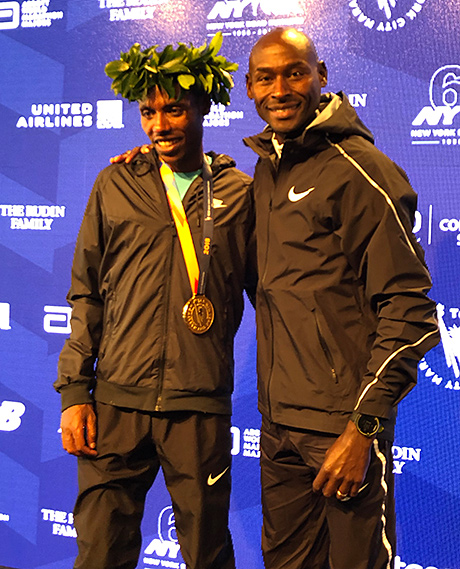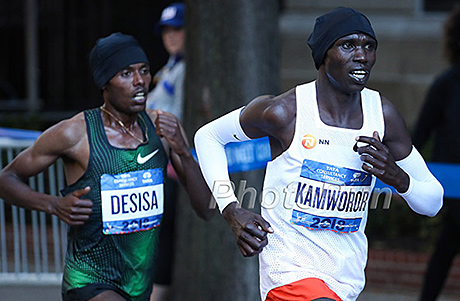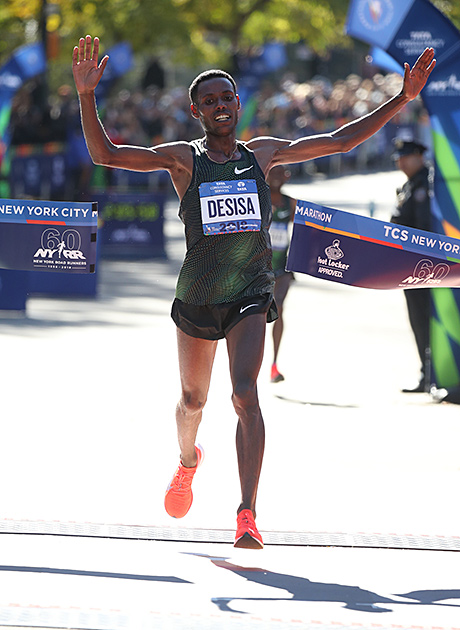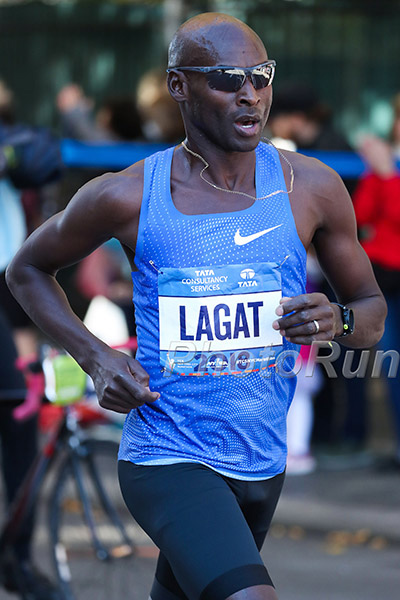|
Coverage Homepage
Post Race:
Men's Post-Race |
Women's Post-Race
| Complete Searchable Results
Pre-Race:
Men:
Men's Preview & Starter List
Women:
Women's Preview & Starter List
Head-to-Heads: Elite Athlete Past Matchups
Extras:
Pace Calculator/Pace Guide/Viewing |
Videos (Athletes/Archival/More...)
More News:
Press Releases |
News (other sources)
Featured Book/Movie:
Run For Your Life |
A Race Like No Other
The 48th Running of the New York City Marathon - The Men's Race [photos to be added soon]
by John Elliott

photo: John Elliott/MarathonGuide.com
Two of the Top Stories of the Day: Desisa Lelisa and Bernard Lagat
|
Conventional Wisdom Busted: Fast Courses and Slow Courses - Pacers and No Pacers
Conventional Wisdom holds that there are two types of Marathon race courses: fast courses, where ultimate leg speed is the final arbiter; and slower, generally hillier courses, where fast times are not possible so the race may be run as a cat and mouse game where strategy and toughness suggest anyone can win. In the former type of course - the fast ones (e.g., Berlin, London, Chicago, Rotterdam, etc.) - the race employs pacemakers to ensure that the runners are encouraged or sometimes moderated and guided to their best possible performance and time. In the latter type of course - the slower/hillier courses (e.g., Boston, New York, etc.) - the races have given up on pacemakers and encourage a race of guts and toughness.
New York, without pacemakers, has not produced the fastest possible times. In some years, the favorites have run slowly watching their expected competition while an underdog sneaks away and gains enough of a lead to follow through to the finish with a win. In other years, inexperienced runners - without the benefit of pacemakers to rein in their enthusiasm - have gone off too quickly, taking others with them on a wild chase only to be humbled by the hills or other difficulties of the distance.
A Foolish 22 year-old Pushes the Pace?
The difficulty of the New York City Marathon course can be measured by the fact that in all of history, only five men had completed the course in a time faster than 2:08. One man only had ever run sub-2:06 and just one other man sub 2:07... New York must be a tough course worthy of respect!
When Shura Kitata of Ethiopia, at only 22 years of age - albeit with nine previous marathons under his belt - took the lead from the start of the race and pushed the pace, we were concerned. And when Kitata at mile 9, seemingly frustrated when others weren't coming with him toward a low-2:08 finish, he looked at his watch and actually looked behind and waved at the other competitors to please come up and join him - we thought that was a bit crazy. When none of the others joined him, Kitata took off alone and by mile 10 had a five second lead on the others - in New York! Admittedly, Kitata's previous three marathons were a 2:04:49 for a runner-up finish at the 2018 London Marathon, a 2:05:50 win at the 2017 Frankfurt Marathon and a 2:07:28 win at the 2017 Rome Marathon - but those were notoriously flat/fast marathons with pacers, this was New York and this was crazy.
Chaos Ahead? Can they really run this fast?
Four men ultimately did choose to join Kitata on the quest for speed. Six men in the field had previously run sub-2:07. And by mile 5, Kitata was at the front, and four of the other five sub-2:07 men were running together ahead of all others. The sixth sub-2:07 man was running alone just behind. Besides the first uphill mile, the group never ran any mile slower than 5 minutes; and many miles were ticked off in the low 4:40s - there was no letting up.
Three Men
By mile 11, the four others had caught and were running with Kitata. Ultimately, however, two of the five could not keep up: Tamirat Tola faded from the group at mile 12 to finish in fourth place while Faustus Talam lost the lead pack at mile 20 and fell back to finish in eighth.

photo: Victah Sailer/PhotoRun
Kamworor Leads Near the End of the Race
|
But three men did hang on to run together nearly to the finish: defending champion Geoffrey Kamworor, early pacesetter Shura Kitata and one-time runner-up & two-time 3rd finisher, Lelisa Desisa. At times it seemed certain that Geoffrey Kamworor would win easily. With just over a mile remaining, Kitata was eight seconds behind and we knew that his early hijinks had caught up with him.
The Finish / The Future?
Into the final mile, somehow, Lelisa Desisa found another gear. And, somehow Shura Kitata found renewed energy. The order of finish was different than we expected when we saw them at mile 25 and while we thought that Kamworor would repeat as champion instead he fell back to third.

photo: NYRR
Lelisa Desisa Winning the 2018 New York City Marathon
|
At the end, Lelisa Desisa won the New York City Marathon in 2:05:59. Shura Kitata finished in second place two seconds back in 2:06:01; and defending champion Geoffrey Kamworor finished in third place in 2:06:23. That time for Kamworor was probabaly the most impressive, just 11 seconds slower than his personal best from the 2012 Berlin, which is arguably the fastest course on the planet. These first three runners finished as the second, third and fourth fastest times ever at New York. As mentioned previously, only two men had ever run sub-2:07 at New York and in this one race three had done it.
And while we thought the men were running too fast and that the hills in the second half of the race would humble them, we were wrong. The men ran the first half of the race in 1:03:55 and ran the second half in 1:02:04 - a negative split. And their 10K splits: 30:48, 29:51, 29:41, 29:20 - what a perfect race.
What is almost as amazing is that these three men - in order of finish - were 28, 22 and 25 years-old. This is the new generation of runner and we can hope and believe that with this depth of talent on the marathon scene and with runners gravitating to the marathon distance at these young ages we can hope to see these sorts of performances for years to come.

photo: Victah Sailer/PhotoRun
Bernard Lagat in the Race
|
Bernard Lagat - American Debut
Could a five-time Olympian / track star - one of the best in history - jump up to the marathon distance and achieve immediate success? That was the question everyone wanted to learn the answer to. Bernard Lagat - who ran a 62:00 and a 62:14 Half Marathon earlier in 2018 was making his marathon debut - at age 43! Lagat hoped to break Meb Keflezighi's USA Masters record of 2:12:20 - could he? Well, as many have learned, the marathon is tough and it was a tough day for Lagat. We note that Lagat's first seven miles were each run at sub-5:00 pace - too fast! - and Lagat didn't really settle into his pace until halfway into the race - that's what happens with adrenaline and more. Lagat passed the halfway mark in 1:06:06, seemingly on schedule, but he was already slowing. The second half of his race took 1:11:14 for a total debut marathon of 2:17:20. That's really not bad for a debut marathon - especially for a 43 year-old. And Lagat, post race, said he now understands the distance and will run it again!
The Other Americans
We wish we could get more excited about the American field and the prospects for American men as evidenced by the results of the 2018 New York City Marathon, but no... Some were excited that four Americans settled in among the top 10 finishers at the New York City Marathon. But we counter that none ran sub-2:12 which suggests that the current crop of American men are still a step or two away from being competitive on the International stage. That said, we do want to give congratulations to Jared Ward for running a personal best 2:12:24 to finish in sixth place. And we will also note that one of our favorite promising marathoners, Shadrack Biwott, perhaps started too fast as he was shadowing the lead group through seven miles before that took its toll on him and he slowed.
All In All...
All in all, one of the best New York City Marathons from multiple perspectives:
- a fast, fast race;
- three runners in a competitive race - we never knew who would be the winner until the final moments of the race;
- with the top 3 under 30 years-old (actually top 5 under 30!), this bodes well for the future of the marathon.
What more could we want? Oh, some more competitive American running, but that will come...
Top Finishers
1. Lelisa Desisa (ETH) 2:05:59 - $100,000 + $45,000
2. Shura Kitata (ETH) 2:06:01 - $60,000 + $40,000
3. Geoffrey Kamworor (KEN) 2:06:26 - $40,000 + $40,000
4. Tamirat Tola (ETH) 2:08:30 - $25,000 + $15,000
5. Daniel Wanjiru (KEN) 2:10:21 - $15,000
6. Jared Ward (USA) 2:12:24 - $10,000 + $25,000
7. Scott Fauble (USA) 2:12:28 - $7,500 + $15,000
8. Festus Talam (KEN) 2:12:40 - $5,000
9. Shadrack Biwott (USA) 2:12:52 - $2,500 + $10,000
10. Chris Derrick (USA) 2:13:08 - $2,000 + $5,000
11. Juan Luis Barrios (MEX) 2:13:55
12. Tadesse Yae Dabi (ETH) 2:13:57
13. Tim Ritchie (USA) 2:15:22 - $3,000
14. Ryan Vail (USA) 2:15:31
15. Jonny Mellor (GBR) 2:16:09
16. Harbert Okuti (UGA) 2:16:51
17. Scott Smith (USA) 2:17:12
18. Bernard Lagat (USA) 2:17:20 - $3,000
19. Girma Bekele Gebre (ETH) 2:18:18
20. Birhanu Dare Kemal (ETH) 2:18:20
21. Mizael Carrera (PUR) 2:19:29
22. Suleman Abrar Shifa (ETH) 2:19:45
23. Diriba Degefa Yigezu (ETH) 2:20:01
24. Temesgen Habtemariam Bekele (ETH) 2:20:16
25. Andrew Davies (GBR) 2:20:23
Coverage Homepage
Post Race:
Men's Post-Race |
Women's Post-Race
| Complete Searchable Results
Pre-Race:
Men:
Men's Preview & Starter List
Women:
Women's Preview & Starter List
Head-to-Heads: Elite Athlete Past Matchups
Extras:
Pace Calculator/Pace Guide/Viewing |
Videos (Athletes/Archival/More...)
More News:
Press Releases |
News (other sources)
Featured Book/Movie:
Run For Your Life |
A Race Like No Other
|








